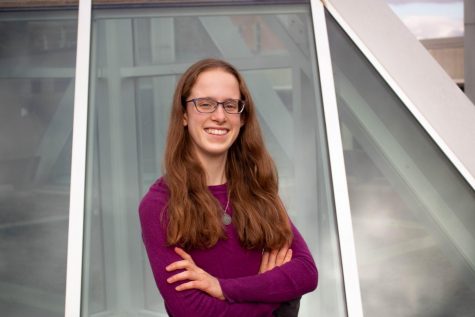TheatreUNI to host Digital Performance Festival
Apr 15, 2020
Every theatre aficionado knows that the show must go on. And even when a global pandemic intervenes, the show still must go on — even if the audience has to become virtual.
That was the thought process behind the upcoming TheatreUNI Digital Performance Festival.
Every semester, students in the theatre department’s directing class, taught by Dr. Amy Osatinski, present the 10-Minute Plays, a class project in which they select, cast, rehearse and stage a 10-minute excerpt from a published play. Rehearsals had already begun for this spring’s plays, scheduled for April 30, when the COVID-19 pandemic forced UNI to move classes online, close campus buildings and cancel group gatherings — including the 10-Minute Plays.
“I had already met with my actors,” said Rachel Winter, a fifth-year theatre performance major who was planning to direct the comedy “The Angel Whisperer.” “We had already started coming up with really funny ideas for their characters, and I was already kind of seeing it fleshed out in my mind. I understand the circumstances and I think it ended up being a good choice to cancel it, but I was pretty disappointed.”
Due to logistical difficulties and copyright restrictions, hosting the 10-Minute Plays online wasn’t feasible, Osatinski said. So she and her class came up with an alternative: the Digital Performance Festival, which will be held from April 26 through May 8 on TheatreUNI’s social media.
“The plan is that each student in the class is going to create a 3-5-minute digital performance of some sort,” Osatinski said. “They’re going to create from inception all the way through execution, editing and stuff like that.”
Those performances will be posted, one per day, on a YouTube channel shared through TheatreUNI social media page.
And what exactly will the performances look like?
“That word ‘performances’ is very broad,” Osatinski said. “There are very few rules about this.”
She said that the students were given basic guidelines: the video must be as high-quality as possible, between 3-5 minutes in length and with content appropriate for a wide audience. Students also cannot use any written text unless it is in the public domain or they have the creator’s permission, and they must adhere to copyright law and YouTube’s guidelines. Other than that, their performance is entirely their own. The students can be in front of the camera, behind it, or both, acting as the writer, cinematographer, actor, editor and more.
“It’s all student driven,” Osatinski said. “The students are doing every bit of what they’re creating, which is what they do with the 10-minute plays as well, so it’s been really cool that we’ve been able to keep that part of the experience.”
That creative freedom was daunting at first, Winter said, but has ultimately given her an opportunity for professional growth.
“It’s made me really think on my feet without immediate pressure,” Winter said. “I had to change my ideas pretty rapidly, but it was a way for me to be creative and figure my way out of a problem and do it on my own. It’s a really good lesson to learn […] to create something from scratch, trust it and share it, which is what I’m going to be doing after graduation.”
Osatinski has also taken the new digital format in stride and incorporated new topics into the curriculum.
“We’ve been able to talk more about digital media tools [and] the use of digital storytelling,” she said. “We’re also thinking more about copyright. We have to be mindful of the way we use other people’s work, looking at what the laws are and what the ethics are when we’re creating content online.”
Besides the issue of copyright, Winter faced the struggle of finding actors and locations when COVID-19 restrictions have shuttered public gathering spaces. Her plan to film in her town park, for example, had to be nixed due to statewide playground closures in an effort to mitigate the spread of the virus.
“It’s just challenging to find places to go to flesh out what you’re thinking,” she said. “I’ve had to change what my story was going to be because of the quarantine.”
However, she’s excited to share her finalized idea: a vlog starring herself as an Iowa girl who believes she’s royalty. Winter said she’s equally eager to see her classmates’ work on display.
“There are a lot of really creative people in my class and in this department, and I’m sure there will be a wide array of subjects and styles and projects,” she said. “It’s been nice just to see everyone, including myself, having fun with this project and just being their most true and enjoyable selves.”
No matter how the finished product turns out, Osatinski said, she’s encouraging her students to take risks and embrace the possibility of failure.
“We talk about a lot the idea that it’s okay to fail,” she said. “They’re getting graded on how hard they try and their ability to grow as artists, not the quality of their work. Continuing to encourage them to invest in their creative process without fear of failure has been a way to continue the work that we did in class.”
To tune into the TheatreUNI Digital Performance Festival, visit TheatreUNI on Twitter @StrayerWood and Facebook @TheatreUNI.







